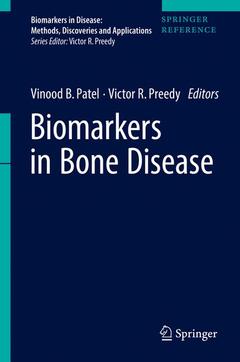Description
Biomarkers in Bone Disease, 1st ed. 2017
Biomarkers in Disease: Methods, Discoveries and Applications Series
Language: English
Subjects for Biomarkers in Bone Disease:
Publication date: 07-2017
Publication date: 07-2017
1185 p. · 15.5x23.5 cm · Hardback
Description
/li>Contents
/li>Biography
/li>Comment
/li>
There are many conditions that affect the skeletal system. On a worldwide basis, osteoarthritis alone affects 10%-15 percent of those over 60 years of age and in some countries more than 30-50% of postmenopausal women will have osteopenia or osteoporosis. With the increasing ageing population, maintaining skeletal health is particularly important. Fractures in the aged, for example, can lead to premature deaths. It is therefore imperative that appropriate use is made of conventional, new and emerging biomarker platforms. Biomarkers in Bone Disease embraces a holistic approach by combining information on different conditions that affect the skeletal system and the use of biomarkers. Biomarkers are described in terms of conventional, new and emerging analytes, techniques, platforms and applications. It covers the latest knowledge, trends and innovations. New platforms are described which combine advances in biomedical sciences, physics, computing and chemistry.
Embraces a holistic approach to many conditions that affect the skeletal system
Describes biomarkers in terms of conventional, new and emerging analytes, techniques, platforms and applications
Updates scientists and professionals on advances across the disciplines
Identifies key facts and defines words and terms for the lay person
Opens the field to the all readers inquiring into this imperative area of research
Includes supplementary material: sn.pub/extras

